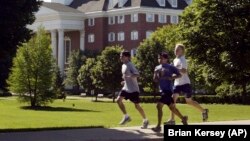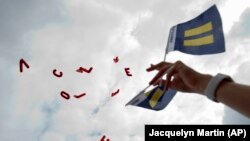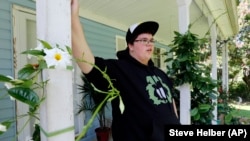Justin Massey chose to study at Wheaton College in 2011 because of the university’s strong religious and academic record.
"I grew up as a very strong Christian and my faith was an important part, thinking about moving forward with my academic studies. And Wheaton, from what I came to know, was widely understood as one of the best academic institutions if you’re looking for somewhere with a strong Christian tradition."
Massey, 23, thought that a Christian university would be a welcoming place. But there was one problem: Massey is a gay, or homosexual, man.
Religious universities across the U.S. have asked the Department of Education for permission to deny equal treatment to homosexual and transgender students.
Title IX is a section of a group of laws called the United States Education Amendments of 1972. Originally, Title IX prevented discrimination based on gender at schools receiving federal money.
This includes any school with students who use federal loans to pay for their studies.
But Title IX does include a special exemption for religious schools. Any school run by a religious organization can ask to ignore Title IX. The schools can make this request if they believe Title IX disagrees with their religious beliefs.
For example, some schools that train men to be members of the clergy ask to deny access to women. Some religions prevent women from training to be clergy members.
The Office for Civil Rights (OCR) is part of the U.S. Department of Education. The OCR enforces Tile IX. The OCR also processes the exemption requests. Seth Galanter is the Deputy Assistant Secretary for Civil Rights at the OCR.
Galanter said schools have always had the right to make this type of request: 227 schools have received exemption from some part of Title IX since 1972.
Wheaton College in Wheaton, Illinois, received an exemption in 1985. But Justin Massey said that the school does accept different types of people.
"I think Wheaton College, as a whole, is a pretty loving environment… It’s just stuck in a … political position."
Problems began for Massey when he started working with the administration. Massey became involved in student government during his first year at Wheaton.
At that time, he had not openly identified himself as gay. But he did start organizing meetings to support lesbian, gay, bisexual and transgender (or LGBT) students.
During his second year, Massey tried to create a formal group supporting LGBT students at Wheaton, called Refuge. But the school’s administration learned that Massey was already involved in student government. They did not want a student with connections to a controversial issue to be part of the student government.
The administration told Massey he could not be the leader of the group he started.
"What I took that to mean was that it was because I was gay and that there was no other similar situation in which a student wouldn’t be allowed to head up a group because of a so-called conflict of interest."
Galanter said that the exemptions do not allow schools to discriminate in any way they want.
"There is not a wholesale exemption. A school, private college or university is only exempt when Title IX conflicts with the religious organization's tenets and only to that extent. And there is an opportunity for an individual who has been harmed to challenge the exemption in an individual case."
But a growing concern among the LGBT community is that the number of exemption requests has increased greatly since 2013. These requests directly involve the parts of Title IX protecting students based on their gender identity and sexual orientation.
The Human Rights Campaign (or HRC) is an organization that protects and supports the rights of LGBT people. The HRC released a report in December 2015 on the religious universities that requested and received these exemptions.
The report showed that before 2013, only one school had requested an exemption from the part of Title IX involving gender identity. There were at least 43 similar requests in 2015.
Sarah Warbelow is the Legal Director for HRC. She wrote the report, called "Hidden Discrimination." Warbelow says it is important that this information becomes widely known.
"The majority of these schools did this under the cover of silence. Very few of them talked about it publicly. They were not telling their students."
The HRC report also claimed that the increase in requests is in response to several recent actions by the U.S. government. These actions have been in support of the LGBT community.
A transgender student accused the Arcadia Unified School District in Arcadia, California of discrimination in 2011. The U.S. Department of Justice and Department of Education decided in 2013 that the school system must provide the student with facilities that matched their gender identity.
The Department of Justice is pursuing a similar solution in another case. A transgender student accused the Gloucester County Public School system in Virginia of discrimination in 2015.
The U.S. Supreme Court also decided that the Constitution protects the right of same-sex marriage in 2015.
Massey chose to publicly declare his sexual orientation in his third year at Wheaton. He also became very involved in LGBT rights issues. He often had problems with the administration.
"There was just so many times that Wheaton was very quick to react to me or what was happening on campus because they were fearful of what it meant."
VOA contacted Wheaton College for a comment. But the school did not give a formal response. VOA emailed 45 of the schools that have received or requested an exemption. Several schools declined to comment. Some offered written statements.
Biola University in La Mirada, California is the only school with a religious exemption to Title IX that agreed to an interview. Jerry Mackey is the university’s Legal Counsel. Mackey said there was no controversy when the school received its exemption in 1985.
"To my knowledge, there was really no reaction; public, private within the institution… I just don’t think it was a controversial issue at the time at all."
Mackey said the media is trying to cause problems for religious colleges and universities. He also said that Biola is a loving place that tries to treat all of its students with care. But, Mackey said, students are free to study at any school they want.
"People are here because they believe this is the place that they want to be… So nobody’s forced to come to Biola or any school."
But Massey does not agree. Massey believes that not all young people have total control of where they can study. Some students need their parents to pay for their education. If they do not go to the school their parents want, they will not receive any higher education.
Other students do not completely understand their own sexuality when they first make their choice of school.
Massey chose to finish his four-year degree at Wheaton for several reasons. He did not have enough money to change schools. Also, he had made many friends at Wheaton whom he did not want to leave. In addition, he felt the school needed students willing to fight for LGBT rights.
Massey enjoyed his experience, but says it was difficult.
"If I had known what I was going to go through, I probably would have been hesitant... It’s not the duty of any minority person to change an institution... But I don’t regret having been at Wheaton College."
He also believes there are still more fights to come.
I’m Pete Musto.
Pete Musto reported and wrote this story for VOA Learning English. Kathleen Struck was the editor.
Now it’s your turn. How are LGBT people treated in your country? Why is it important for everyone to have access to equal education? Please let us know in the Comments section or on our Facebook page.
________________________________________________________________
Words in This Story
academic – adj. of or relating to schools and education
faith – n. strong religious feelings or beliefs
homosexual – adj. sexually attracted to people of the same sex
transgender – adj. of or relating to people who have a sexual identity that is not clearly male or clearly female
gender – n. the state of being male or female
exemption – n. freedom from being required to do something that others are required to do
lesbian – adj. a woman who is sexually attracted to other women
bisexual – adj. sexually attracted to both men and women
formal – adj. made or done in an official and usually public way
controversial – adj. relating to or causing much discussion, disagreement, or argument
allowed – adj. given permission to do something
wholesale – adj. affecting large numbers of people or things
tenet(s) – n. a belief or idea that is very important to a group
extent – n. used to indicate the degree to which something exists, happens, or is true
challenge – v. to say or show that something may not be true, correct, or legal
gender identity – n. a personal belief of oneself as male or female, or rarely, both or neither
sexual orientation – n. the state of being bisexual, heterosexual, or homosexual
facilities – n. a room or rooms with a sink and toilet and usually a bathtub or shower
hesitant – adj. slow to act or speak especially because you are nervous or unsure about what to do







